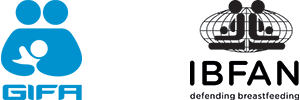
Pink October is an opportunity to highlight the importance of prevention and solidarity with all women affected by breast cancer.
Raising awareness also means providing information about protective factors that can help reduce the risk of developing this disease.
Among these factors, breastfeeding plays a recognised role in the prevention of certain non-communicable diseases, including breast cancer and ovarian cancer.
The World Health Organisation (WHO) and the National Cancer Institute (INCa) confirm that breastfeeding reduces the risk of breast cancer.
The longer the total duration of breastfeeding, the lower the risk of developing breast cancer.
A meta-analysis published in The Lancet estimates that each cumulative period of approximately 12 months of breastfeeding reduces the risk of breast cancer by approximately 4 to 5%.
This phenomenon can be explained in part by the reduction in the number of menstrual cycles and the exposure of breast cells to oestrogen. Other mechanisms are involved, such as the fact that breast epithelial cells differentiate more during pregnancy and lactation. These more mature cells are less likely to undergo cancerous mutations. During lactation and weaning, breast tissue is renewed. This remodelling can help eliminate damaged or abnormal cells.
Breastfeeding is also associated with a reduced risk of diabetes, cardiovascular disease and postpartum depression. In addition, it also helps to reduce the risk of anaemia and promotes the mother’s general well-being after childbirth.
Thus, breastfeeding helps protect both the health of the child and that of the mother who breastfeeds, with long-term benefits for both.
Even when October is over, prevention and the dissemination of accurate information continue throughout the year.
Let’s keep talking about it and sharing best practices!
Sources
- Breast cancer and breastfeeding: collaborative reanalysis of individual data from 47 epidemiological studies in 30 countries, including 50 302 women with breast cancer and 96 973 women without the disease. Interpretation: The longer women breast feed the more they are protected against breast cancer. The lack of or short lifetime duration of breastfeeding typical of women in developed countries makes a major contribution to the high incidence of breast cancer in these countries. https://www.thelancet.com/journals/lancet/article/PIIS0140-6736(02)09454-0/abstract (2002)
- Association between breastfeeding and breast cancer risk: evidence from a meta-analysis. Conclusions: The results of this meta-analysis suggest that breastfeeding, particularly when prolonged, is inversely associated with breast cancer risk. https://pubmed.ncbi.nlm.nih.gov/25785349/ (2015)
